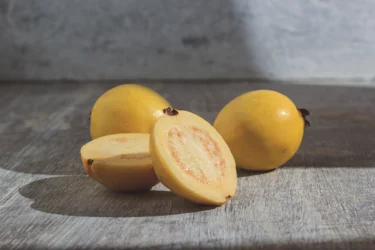Incredible Health Benefits of Guava Fruit & Its Leaves
By Dr. Malavika Athavale +2 more

Get,

to manage your symptom
Get your,


4 Cr+ families
benefitted

OTP sent to 9988776655



You’ve successfully subscribed to receive
doctor-approved tips on
Whatsapp

Get ready to feel your best.

Hi There,
Download the PharmEasy App now!!


Register to Avail the Offer
Send OTPBy continuing, you agree with our Privacy Policy and Terms and Conditions

Hi There,
Sign up on PharmEasy now!!
Trusted by 4 crore+ families

OTP sent to 9988776655



You have unlocked 25% off on medicines




Code: NU25

Comments


Leave your comment here
By Dr. Malavika Athavale +2 more
Table of Contents
Guava is a tropical fruit found in Venezuela, Mexico and Colombia. It is usually eaten fresh or made into beverages, while its skin and leaf are used in traditional home remedies. While some believe guava can cause a cold (something that might be true for a few sensitive individuals) it also comes with a host of impressive health benefits1.
Guava is helpful to manage health problems such as high blood pressure, diarrhoea, diabetes, cough and different types of cancer. It is also good for people with diabetes and can be included in your diabetes diet plan.

Well, how does guava do all of this? The answer to this question is that guava has a high source of vitamin C and fibres that act as antioxidants. These antioxidants help reduce or stop harmful effects caused by oxidation2.
Guava is a fruit with medicinal properties and may be beneficial in many health problems such as diarrhoea, blood pressure and many more conditions. Here are some facts about guava that you may find interesting3,4:
If pineapple holds the title of “king of fruits”, then guava certainly earns its name as “queen of fruits,” all because of its medical properties. Guava was first sold in the market in Florida in 1847, and between 1948 and 1969, Hawaii introduced 21 different cultivars of guava. However, guava trees are sensitive to sudden drops in temperature, which can severely affect their growth or even cause the trees to die5.
Here are some key nutritional facts about guavas you should know4:
| Guava contents per 100g | Amount |
| Calories | 68 |
| Carbohydrates | 14.32g |
| Fibre | 5.4g |
| Fats | 0.95g |
| Protein | 2.55g |
| Vitamin C | 275% of the daily recommended intake |
| Folate | 12% of the daily recommended intake |
| Vitamin B5 | 9% of the daily recommended intake |
| Vitamin B6 | 8% of the daily recommended intake |
| Niacin | 7% of the daily recommended intake |
| Magnesium | 6% of the daily recommended intake |
| Potassium | 9% of the daily recommended intake |
| Phosphorus | 6% of the daily recommended intake |
| Manganese | 5% of the daily recommended intake |
Note: Guava has great medicinal benefits, but it must be consumed in moderation. It is important to note that guava contains fructose, which can be harmful to your health if consumed in large quantities.
Most guava trees have similar characteristics, but there are some differences based on climate. In colder climates, guava trees grow up to 12 feet tall, while in warmer climates, they can reach heights of up to 20 feet. Guava plants require extra care during winter months, as they are sensitive to cold and sudden temperature drops6.
The two common types of guavas as follows5:

These guavas are also called desert guavas and usually taste sweet and appear to be pink in colour. This variety of guavas is easily available in the market around you. This high-quality variety is often sold in Hong Kong and has a smooth texture with fewer seeds.

This variety tastes acidic and mild with no fragrance. The inside layer appears to be pale white or yellow while the skin looks green when ripe. This variety may also turn pinkish when ripe.
Note: Though there are many different varieties of guavas, all of them are known to be a powerhouse of healthy nutrients.
Guava fruits or the “queen of all fruits” are considered to be high in medicinal value. A 100-grams serving of guava fruit contains just 68 calories and 8.92 grams of natural sugar, making it a nutrient-dense option for a healthy diet. It is also rich in calcium and contains around 18 grams of essential minerals for every 100 grams, making it beneficial in supporting various aspects of health and help manage different diseases4.
However, in order to understand how beneficial this tropical fruit can be, let’s take a closer look into the health benefits of guava.

Guava is rich in vitamin C and is said to contain four times the content of vitamin C found in oranges4. Vitamin C helps boost immunity which helps the body to fight common infections and pathogens. Also, more vitamin C helps in good eyesight2.

Vitamin C, lycopene and other types of polyphenols act as antioxidants that help in neutralising infections in the body that prevent the growth of cancerous cells. Clinical studies2,7 suggests that guava fruit may prevent prostate cancer and also prevents the growth of breast cancer cells.
In my experience, I have observed that water extracts of guava may have anti-proliferative activity against KB cells. This means that the extracts have the ability to inhibit the growth and division of certain harmful cells10.
Dr. Rajeev Singh, BAMS

Guava benefits people who are managing blood sugar levels, as it has a high content of fibre and glycaemic index that helps prevent the development of diabetes. You may refer to glycemic index food chart to find out the GIs of other foods and modify your diet accordingly. Fibre content regulates blood sugar levels from spiking, while glycaemic index also restricts your blood sugar to rise at a short rate2.

Guava contains high amounts of sodium and potassium that helps the body to balance and regulate high blood pressure in patients suffering from hypertension. Guavas help in reducing cholesterol that is one of the primary reasons for heart diseases. However, this fruit increases the levels of good cholesterol and substitutes this with bad cholesterol2.

Guavas contain high amounts of good dietary fibre when compared to other fruits. One guava a day contains 12 per cent of fibre intake that makes it highly beneficial for digestive health. It also helps in healthy bowel movements. This reduces your risk of constipation2.

Guava fruit contains vitamin A that helps boost an individual’s eyesight. Eating guava not only prevents bad eyesight but also prevents you from developing cataracts and macular degeneration4.

Guava contains magnesium in the fruit that helps relax your muscles and nerves. So, this means that after a hard workout or a long day at the office, you need just one guava to get you relaxed. This fruit helps you combat stress and provides a good energy boost to your system2.

Guavas benefit pregnant women such that it contains folic acid and vitamin B-9 which is recommended to be given for women since it helps in developing the baby’s nervous system and protects the baby from neurological disorders8.

Guava leaves benefit dental health due to their anti-inflammatory action and antibacterial ability that fights infections and kills germs and people consuming guava leaves at home will help curb toothaches. The juice from the guava leaves is also said to provide relief from swollen gums and oral ulcers2.

Guava benefits people suffering from colds and coughs, as it has a very high content of vitamin C and iron compared to other fruits. However, guava is believed to help from getting a bad cold or any viral infection. The juice from raw guavas is very beneficial in curing cough and cold. It gets rid of the mucus and disinfects the respiratory tract, throat and lungs5.

Many women experience bad and painful cramps as period symptoms and guava leaf extract may help reduce the pain during menstruation. A study2 which involved 197 women consuming guava leaf extract (6 mg) found that it greatly helped in reducing the pain.
Over the years, I have observed that the leaf of Psidium guajava, commonly known as guava, has a spasmolytic effect. This means that it can help relieve spasms or involuntary contractions of certain muscles. The main component responsible for this effect is a compound called quercetin, which is found in its leaf and the plant extract10.
Dr. Smita Barode, B.A.M.S, M.S.
Also Read: Curry Leaves (Kadi Patta): Uses, Benefits, Side Effects and More!
While we often rely on western medicine for common issues like fever, cold, or cough, it is important not to overlook the beneficial properties of natural remedies, particularly guava leaves. If guava fruit is healthy, then its leaves are super healthy. If the fruit is known for its health benefits, the leaves are even more impressive in what they offer.
Here are some of the benefits of guava leaves that you need to know2:
Note: Guava leaves can be boiled in hot water and consumed or made into a cup of tea, ensure to seek your healthcare provider’s advice to see if this may be beneficial to your situation.
Hair fall is often a sign of an unhealthy scalp and guava leaves can help stop hair fall and strengthen the scalp because of their anti-inflammatory, antimicrobial, and antioxidant properties. They can also be effective in helping with common scalp issues like dandruff.
Guava is also rich in vitamin B & C which helps in nourishing hair and helps in hair growth. So if you have a guava tree in your garden, don’t let those leaves go to waste. Instead of discarding or burning them, grind them into a paste and gently apply it to your scalp. This simple remedy can strengthen your roots and significantly reduce hair fall9.
Just as green tea is considered healthy, guava leaf tea might just be the next big thing in natural wellness. Known for its potent healing properties, it can be especially beneficial for digestive issues like abdominal pain or diarrhoea. To make guava tea, add guava leaves to boiling water and boil for 20 minutes. Then strain the water and allow it to cool for 5 minutes and consume this tea while lukewarm, preferably on an empty stomach and you may find instant relief from digestive problems2.
Based on my experience, I have observed that water extracts of guava may have liver-protective activity. They have been found to significantly reduce elevated levels of liver enzymes and bilirubin in the blood. Guava extract may have a protective effect on the liver, promoting its health and function10.
Dr. Siddharth Gupta, B.A.M.S, M.D (Ayu)
Also Read: Know About 20 Super Healthy Leaves You Must Eat!
Guava stands out not only for its nutritional value but also for its traditional and therapeutic uses. Its unique blend of vitamins, minerals, and plant compounds supports various body systems, while the leaves offer added medicinal properties. As a natural, accessible option, guava can play a supportive role in everyday health when consumed mindfully.
Also Read: Betel Leaves: Uses, Benefits, Side Effects By Dr. Smita Barode
Guava fruit and its leaves, have medical properties that can be beneficial to you. However, it is better to consume it in moderation. Here are some frequently asked questions (FAQs) that will give you an insight about guava fruits and their other health benefits.
Individuals with diabetes are usually advised to eat apples, but guava can also be an alternative snack for diabetics. Guava is rich in dietary fibre and can help ease constipation but it can also help lower the risks of developing type 2 diabetes. It contains high levels of vitamin C that can be helpful for many health-related problems. You may find it beneficial to have one guava a day as a part of your fitness diet as a diabetic with the guidance from a healthcare provider.
Guava and egg are considered healthy, but some may be allergic. If you want to consume both boiled egg and guava together, then it is advised that you consult a doctor and seek medical advice to make sure this is safe in your case.
The white guava and pink guava are the same in terms of their nutrition content, but what makes them different is their colour, taste, and that they are found in different countries.
Guava can be eaten at any time but preferably not on an empty stomach. This is because, if your body needs to reap the benefits of these fruits, there must be some food in your stomach for it to digest and mix along with, you can consume guavas 30 minutes after you finish eating.
Guava fruit, as well as its leaves, have medicinal properties that can be beneficial for certain health problems. However, make sure that you do not consume it in excess. Make sure to consult a doctor to know if you are allergic to guavas.
While the fibre content and low glycaemic index typically make guava safe for diabetics, if you consume too much guava too quickly, it may spike your blood sugar. This is especially true if you consume a particularly sweet variety of guava. For most people, however, moderate consumption of guava is an exceptionally healthy dietary choice.
Yes, when consumed in large amounts or if you already have a digestive issue, then guava may contribute to diarrhoea. One factor that may contribute to this is that guava contains indigestible seeds, another factor is that it may possibly result in insufficient absorption of fructose.
Yes, guava can be eaten raw and it is usually consumed in this form. Make sure to check whether the guava you have purchased is ripe before you eat it.
1. Arévalo-Marín E, Casas A, Landrum L, Shock MP, Alvarado-Sizzo H, Ruiz-Sanchez E, et al. The Taming of Psidium guajava: Natural and Cultural History of a Neotropical Fruit. Frontiers in Plant Science [Internet]. 2021 Sep 28 [cited 2025 Apr 23];12. Available from: https://pmc.ncbi.nlm.nih.gov/articles/PMC8505677/
2. Díaz-de-Cerio E, Verardo V, Gómez-Caravaca AM, Fernández-Gutiérrez A, Segura-Carretero A. Health Effects of Psidium guajava L. Leaves: An Overview of the Last Decade. International Journal of Molecular Sciences [Internet]. 2017 Apr 24 [cited 2025 Apr 23];18(4). Available from: https://www.ncbi.nlm.nih.gov/pmc/articles/PMC5412476/
3. Plant Village. Guava | Diseases and Pests, Description, Uses, Propagation [Internet]. plantvillage.psu.edu. [cited 2025 Apr 23]. Available from: https://plantvillage.psu.edu/topics/guava/infos
4. Hussain SZ, Naseer B, Qadri T, Fatima T, Bhat TA. Guava (Psidium Guajava)- Morphology, Taxonomy, Composition and Health Benefits. Fruits Grown in Highland Regions of the Himalayas [Internet]. 2021 [cited 2025 Apr 23];257–67. Available from: https://www.researchgate.net/publication/352417612_Guava_Psidium_Guajava-_Morphology_Taxonomy_Composition_and_Health_Benefits
5. Guava [Internet]. Purdue.edu. 2019 [cited 2025 Apr 23]. Available from: https://www.hort.purdue.edu/newcrop/morton/guava.html
6. Crane JH, Balerdi CF. Guava Growing in the Florida Home Landscape. EDIS [Internet]. 2006 Oct 11 [cited 2025 Apr 23];2006(18). Available from: https://hos.ifas.ufl.edu/media/hosifasufledu/documents/pdf/in-service-training/shared-related-publications/Guava-Growing-in-the-Florida-Home-Landscape.pdf
7. Jamieson S, Wallace CE, Das N, Bhattacharyya P, Bishayee A. Guava (Psidium guajava L.): a glorious plant with cancer preventive and therapeutic potential. Critical Reviews in Food Science and Nutrition [Internet]. 2021 Jul 21 [cited 2025 Apr 23];1–32. Available from: https://www.tandfonline.com/doi/10.1080/10408398.2021.1945531?url_ver=Z39.88-2003&rfr_id=ori:rid:crossref.org&rfr_dat=cr_pub%20%200pubmed
8. N. Olii, Sukaisi, Asriah, S.Y. Kusika, Zuraidah. The effect of red guava (Psidium guajava L.) juice on pregnant women’s hemoglobin level. Food Research [Internet]. 2022 Jun 26 [cited 2025 Apr 23];6(3):382–8. Available from: https://www.researchgate.net/publication/361552422_The_effect_of_red_guava_Psidium_guajava_L_juice_on_pregnant_women
9. Ruksiriwanich W, Khantham C, Muangsanguan A, Phimolsiripol Y, Barba FJ, Sringarm K, et al. Guava (Psidium guajava L.) Leaf Extract as Bioactive Substances for Anti-Androgen and Antioxidant Activities. Plants [Internet]. 2022 Jan 1 [cited 2025 Apr 23];11(24):3514. Available from: https://www.mdpi.com/2006336
10. Akanda MdKM, Mehjabin S, Uzzaman S, Parvez GMM. A short review on a nutritional fruit: Guava. ResearchGate. 2018 [cited 2025 May 14]. Available from: https://www.researchgate.net/publication/330702066_A_short_review_on_a_Nutritional_Fruit_Guava
Disclaimer: The information provided here is for educational/awareness purposes only and is not intended to be a substitute for medical treatment by a healthcare professional and should not be relied upon to diagnose or treat any medical condition. The reader should consult a registered medical practitioner to determine the appropriateness of the information and before consuming any medication. PharmEasy does not provide any guarantee or warranty (express or implied) regarding the accuracy, adequacy, completeness, legality, reliability or usefulness of the information; and disclaims any liability arising thereof.
Comments

Leave your comment...

View all comments(15)
You may also like
Thanks for the information it’s so helpful .
You are most welcome. Glad you found it helpful. Stay tuned for more such articles.
Very helpful article
Thank you, glad you liked it.
Thank you for this interesting information. We have a guava tree , my mother used it’s leaves if one of us has diarrhoea or upset stomach we also uses it on our hair to grow . In winter we drink the leaves as tea for coughs .
Glad you liked it. Keep reading. Thank you for your feedback.
Thank you for this article. Wanted also to ask how many times in a day we need to drink the tea?
Thank you for your help, very useful
Great , thank you very much.
Thanks a lot for all d information,may God bless u
Thanks for this informations about guava leaves there are ndeed helpful.
Please I have a request.
I’m Joel an Agriculturalist, and a Researcher and I’m very passionate about Healthcare. I’mis a firm believer that everyone can obtain a healthy and beautiful smile with the proper treatment options available today round the world.
I have find all the information on your website so helpful and I will be glad if you can PERMIT me to copy and make use some of your contents I mean your write up in my works?
Thank you.
thank you so much…
Thanks for the information it’s so helpful .
You are most welcome. Glad you found it helpful. Stay tuned for more such articles.
Thank you for this interesting information. We have a guava tree , my mother used it’s leaves if one of us has diarrhoea or upset stomach we also uses it on our hair to grow . In winter we drink the leaves as tea for coughs .thank you so much…Glad you liked it. Keep reading. Thank you for your feedback.Thank you, glad you liked it.
Thank you so much it is very interesting
Thank you so much